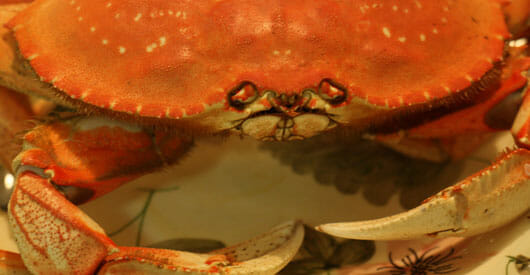
Passion is a funny thing. Sometimes it opens you to experiences you could never have had without it. Other times, it blinds you to what’s right in front of you if you would only look.
I was passionate about cooking. But I had spent a lifetime cooking and eating within a pretty narrow band of the culinary palette, mostly American and European.
Recently Nepalese restaurants sprouted in our little city, along with Afghani, Indian, Thai, Vietnamese restaurants. All of a sudden we had Puerto Rican Cubano sandwiches and Spanish chorizo tapas. We could shop in the Lebanese market and stop for lunch at the Danish coffeehouse.
Wednesday is cooking day in America’s newspapers, and this particular Wednesday the New York Times had several Asian recipes that made my mouth water and had my imagination churning. Could I make it for our family dinner? Why not? Refreshing and light, it looked like a great match, and it would be something new and fun.
Crab salad, cole slaw, and a simple dumpling cooked like a potsticker. A quick trip to the store. I folded the newspaper and propped it on the counter. I was off and running.
In the kitchen it pays to be alert all the time, of course. High heat, open flames and sharp knives all hover nearby. But doing prep is more of a meditation for me. Cleaning up a cabbage with the big chef’s knife, cutting it in half, and slicing it into a chiffonade of crisp green strips is fun and pretty mindless. I lost myself in the assembly of the dinner. Dressing to be whisked, crab to be cooked, spices and ingredients assembled just so. There’s a hypnotic quality to this kitchen work that’s powerful and, at least for me, comforting.
The crab came out great, with citrusy accents. It had delicate strips of jicama and red pepper for color, a bright vinaigrette holding it all together. The slaw was crunchy with a tang of apple cider vinegar. And the dumplings had a crunch on the outside, soft and steamy on the inside, just luscious.
At the time my son was about 12 and he preferred combinations of wheat and cheese. Mac and cheese, cheese pizza. Cheese raviolis, cheese quesadillas. This is how his palette has been conditioned.
That, and all those years when we would pack him and his laughing, pushing, arm-punching friends into the back of the Volvo and take them, still in their karate gear over to Micky D’s for the happiness of the happy meal. Or the 10 p.m. runs over to BK for a cheeseburger and fries. That’s the backstory.
So in they come, looking a bit skeptical at my spread. To me it looks like it’s right out of the Times, I’m so excited. I load up their plates and dig in. I’m happy—it’s the best Asian-style meal I’ve ever made, and I’m astonished it came out so well the first time.
But a few minutes in and they both stop. I look from one to the other, but they both look like they’ve bitten into something bad.
“I can’t eat this,” Mom says.
“Me neither. It sucks,” chimes in Junior.
“Wha… What do you mean?” I’m gasping, “It’s great!”
They both look at me with pity. Mom turns to the boy.
“Hey, you want to go Burger King? They’re still open.”
His face explodes in happiness, damn her.
“Sure! Can we?”
And a minute later they’re up and gone, just like that. As the garage door grinds down, I’m alone, cleaning up. Where did I go wrong?
Next day I’m in the kitchen. I’ve moved on. It’s just one meal, they don’t have to like it.
Mom’s standing at the fridge, a container in hand. It’s the crab salad and it looks like she’s about halfway through and not slowing down.
“I thought you didn’t like it,” I say to the top of her head.
“It’s not so bad, actually. It’s pretty good,” she says, pausing for a minute. “But he‘s never going to eat that, it’s too fancy. Are you an idiot?”
I stand there, rooted to the spot. My mind is blank. I seem to be standing on a cliff edge, suspended in space. The world spreads out around me, in the near and far distance. I know nothing of them because I am unable to move or think. I am just an ordinary observer. From the Greek, idiota “ordinary person, layman.”
The journeys of the ordinary idiot occupy a special place in spiritual literature, and in stories of the quest for truth. They are closely tied to the stories of the jester, the fool.
The ordinary man, the idiot, is close enough to his own life to have a direct perception of the world, but in only one way, in one sphere. The idiot is simple, and punctures the arguments of the so-called wise men by the forthright and direct way he speaks simple truths.
And so each of us, in our own way, is a kind of metaphysical “idiot,” capable of transforming our “way” into our own pathway to truth.
For me that truth was obscured by my enthusiasm. I couldn’t see past my passion to the truth of who I was cooking for.
Mom goes back to the crab.
Eventually I snap out of it. “Well,” I say, “it usually tastes better the next day. Enjoy!”


